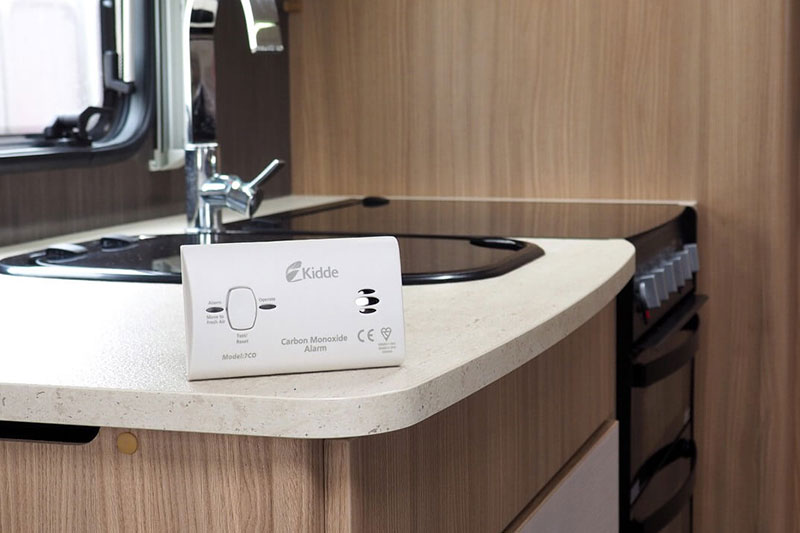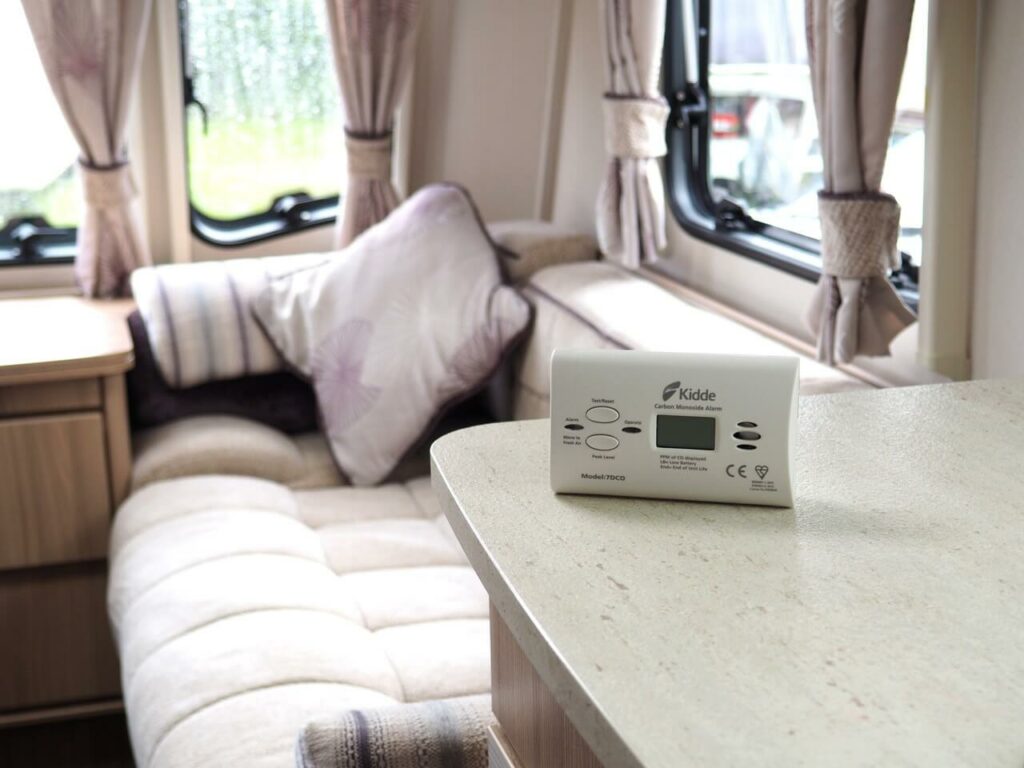Wednesday 15th October 2025
Key Takeaways
- Carbon monoxide poses a heightened risk in travel accommodation, particularly in countries without CO alarm legislation.
- The loss of 24-year-old Hudson Foley sparked the Pack Safe Appeal, urging all travellers to carry portable CO detectors.
- Travel carbon monoxide alarms undergo rigorous testing to ensure reliability in caravans, boats, tents and motorhomes.
- Small spaces like tents and caravans allow CO concentrations to build up faster than in homes.
- Modern travel CO detectors are lightweight, portable and designed for travel environments.
Every year, thousands of British travellers set off on adventures. They backpack through South America. They caravan through the Scottish Highlands. But there’s an invisible danger that claims over 50 lives annually in the UK alone. That danger is carbon monoxide. And for one British family, it changed everything.
A Family’s Mission: The Hudson Foley Story and the Pack Safe Appeal
Hudson Foley was 24 years old. He went to sleep in a homestay in Quito, Ecuador but lost his life because of carbon monoxide poisoning from an undetected leak.
Hudson’s death wasn’t just another statistic: it became a catalyst for change. His family established the Pack Safe Appeal in his memory. It’s more than awareness. It’s a movement born from loss. Cathy Foley and family transformed their grief into action. They’ve appeared on BBC Breakfast. They’ve partnered with The Safer Tourism Foundation. Because they don’t want any other family to endure what they have.
Their message couldn’t be clearer. Countries like Ecuador, South America and Australia don’t require carbon monoxide alarms by law. These are popular backpacking destinations. The accommodation Hudson trusted had no detection system. This isn’t negligence. It’s a regulatory gap and a lack of education that leaves millions vulnerable.

Understanding the Hidden Threat: Why Travel Increases CO Risk
Carbon monoxide is the silent killer. You can’t see it. You can’t smell it. You can’t taste it.
And when you’re travelling, the risk multiplies.
The Perfect Storm: Small Spaces and Multiple Sources
Think about where you stay when you’re camping, caravanning or on a boat. You’re surrounded by potential CO sources:
- Vehicle exhausts from nearby cars and motorhomes.
- Portable generators powering campsites.
- Barbecues and camping stoves.
- Boat engines and onboard heating systems.
- Poorly maintained appliances in budget accommodation.
Carbon monoxide builds up faster in small, confined spaces. A tent, caravan or boat cabin can reach dangerous CO levels in minutes. Not hours. Minutes.
The Regulatory Lottery: Safety Standards Vary
The UK has strict regulations. We require gas safety checks, chimney sweeping and flue clearing. But these standards don’t follow you abroad. Your protected home environment stays at home. Only a travel carbon monoxide detector can fill that gap.
The Science of Travel CO Alarms: Not All Detectors Are Equal
Here’s what many travellers don’t know: your home CO alarm isn’t always designed for travel.
Travel carbon monoxide alarms undergo additional testing under BS EN50291-2. They’re subjected to movement, vibration and environmental conditions that could break standard alarms.
This specialised testing ensures these devices can:
- Function reliably during vehicle movement.
- Withstand temperature changes in tents and caravans.
- Resist humidity in marine environments.
- Stay accurate despite constant relocation.
Alarms certified to BS EN50291-2 have specific classifications. They’re either ‘suitable for camping/caravans/boats’ or ‘suitable for camping/caravans/motorhomes’. This isn’t marketing speak. It’s certification that ensures your travel CO alarm will work when you need it.
Essential Features of Modern Travel Carbon Monoxide Detectors
Travel CO detectors, like the UltraFire ULLCO10 with travel strap, have a minimal design with maximum protection.
Portability Without Compromise:
- Compact, lightweight design.
- Travel strap for securing to bags, tents or caravan fixtures.
- 10-year sealed lithium battery: no replacements needed.
- Clear LED indicators you can see in low light.
Reliability When It Matters:
- 85dB alarm.
- Kitemarked to BS EN 50291-1 and BS EN 50291-2 standards.
- Works in homes, hostels, Airbnbs and rooms with fuel-burning appliances.
- Separate test and silence buttons for easy maintenance.

Practical Protection: Choosing the Right CO Alarm for Travel
Different trips need different protection. So how do you choose the right CO alarm for travel?
For Backpackers and Hostel Stays: You need ultra-portable models with securing straps. Clip them inside your backpack during transit. Deploy them quickly in any accommodation.
For Caravan and Motorhome Adventures: Choose models certified for vehicular movement. Road vibration triggers false alarms in inadequate detectors. Don’t risk it.
For Boat and Marine Travel: You need alarms tested for marine environments. Boat-specific CO detectors must handle humidity and salt air. And they need to stay accurate.
Real Stories, Real Impact: Why Every Traveller Needs Protection
Sarah’s a gap-year student from Manchester. She shares her experience:
“I never thought about CO until I met a fellow backpacker. His roommate nearly died in a Thai hostel. Now my travel CO alarm goes everywhere. It weighs less than my phone charger but could save my life.”
The statistics back Sarah’s caution. We don’t have comprehensive global data. But documented cases show a pattern: travellers face elevated CO risk. Especially in budget accommodation and rural settings where safety standards lag.
Taking Action: Your Travel Safety Checklist
Before You Travel:
- Buy a certified travel carbon monoxide alarm.
- Test it and learn what the indicators mean.
- Pack extra batteries if your model isn’t sealed.
- Research CO safety standards in your destination.
- Get to know the signs and symptoms of CO poisoning.
At Your Accommodation:
- Set up your CO detector immediately.
- Position it at breathing height when sleeping.
- Check for potential CO sources nearby.
- Never ignore an alarm: evacuate immediately and get help.
Supporting the Movement: We proudly support the Pack Safe Appeal. Get 15% off travel CO alarms with code HUDSON15 at checkout. We’re honouring Hudson’s memory and protecting future travellers.
The Cost of Complacency vs The Value of Protection
A quality CO detector for travel costs less than one night in most hostels. Yet it provides years of protection.
The UltraFire ULLCO10 has a 10-year warranty and battery life. That’s mere pence per day. Insignificant compared to the protection it provides.
Carbon monoxide doesn’t discriminate. It doesn’t care if you’re a seasoned adventurer or a first-time traveller. Your destination doesn’t matter. Neither does your budget or accommodation type.
But you can take control. Carry a certified travel carbon monoxide detector. You’re not just protecting yourself. You’re joining a movement started by families like Hudson Foley’s. You’re ensuring every traveller has the chance to return home safely.
Don’t let your next adventure become a preventable tragedy. Explore our range of certified travel CO alarms. Take advantage of special pricing in support of the Pack Safe Appeal.
All information correct at time of posting.

